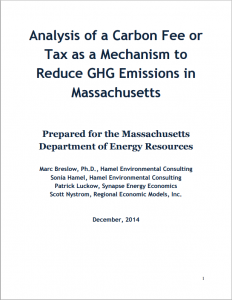Full Title: Analysis of a Carbon Fee or Tax as a Mechanism to Reduce GHG Emissions in Massachusetts
Author(s): Marc Breslow, Ph.D., Sonia Hamel, Patrick Luckow, and Scott Nystrom
Publisher(s): Synapse Energy Economics Inc.
Publication Date: December 1, 2014
Full Text: Download Resource
Description (excerpt):
Massachusetts is a national leader in energy and environmental policy. From energy efficiency and clean energy policies to environmental planning and protection efforts, Governor Deval Patrick’s Administration has made combating and preparing for climate change a major component of his tenure.
This study was commissioned by the Massachusetts Department of Energy Resources (DOER) to analyze how a possible revenue-neutral carbon tax (or fee) could be implemented in the Commonwealth. The study was the outcome of discussions between several stakeholders and public officials including former Massachusetts Energy and Environmental Affairs Secretary Rick Sullivan; Massachusetts Energy and Environmental Affairs Secretary Maeve Vallely Bartlett; , Senator Marc Pacheco – Chair, Senate Committee on Global Warming and Climate Change; Senator Michael Barrett; Representative Frank Smizik – Chair, House Committee on Global Warming and Climate Change, and; Representative Thomas Conroy.
A carbon fee/tax is a simple and transparent way to create a price for emitting carbon dioxide (and possibly other greenhouse gases) to the atmosphere. Such a fee/tax would support the state’s other policies that contribute to meeting the mandates of the Global Warming Solutions Act (GWSA) of 2008 and the roadmap set by the Massachusetts Clean Energy and Climate Plan for 2020. These documents require the state to reduce its greenhouse gas (GHG) emissions to
25% below the 1990 level by 2020 and to at least 80% below 1990 by 2050.
